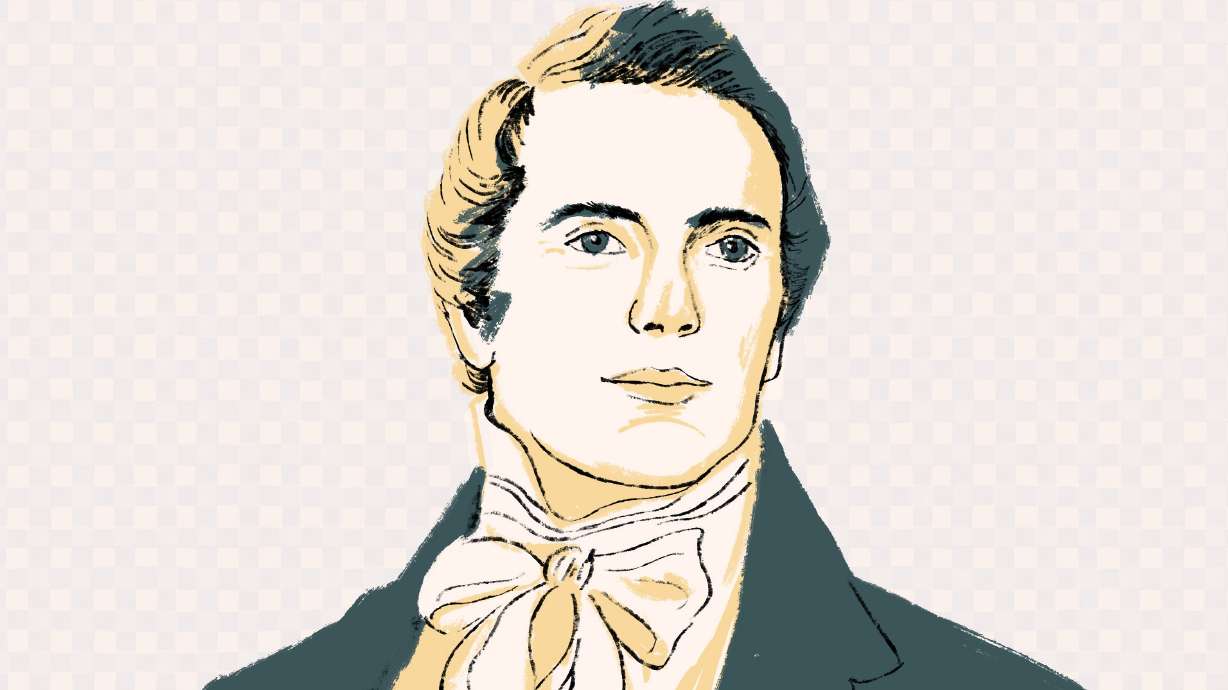Estimated read time: 4-5 minutes
This archived news story is available only for your personal, non-commercial use. Information in the story may be outdated or superseded by additional information. Reading or replaying the story in its archived form does not constitute a republication of the story.
SALT LAKE CITY — For Latter-day Saints across the globe, Thursday marks the 180th anniversary of a tragedy — on June 27, 1844, an armed mob stormed into Carthage Jail and took the lives of the prophet Joseph Smith and his brother Hyrum Smith.
Smith and members of The Church of Jesus Christ of Latter-day Saints were in Illinois due to religious persecution and violence they had experienced. The martyrdom of both Joseph and Hyrum Smith led to the Saints trekking further westward to live their faith.
From the fateful day where Smith saw God the Father and Jesus Christ in a grove of trees to the weeks he spent translating the golden plates with scarce formal education, he recorded accounts of miracles and revelations mixed in with human moments and experiences.
All written records that remain from Smith's 38 years on earth can be found stretched across the 27 volumes of the Joseph Smith Papers. It's a static account of the legacy he's left behind that has inspired millions of people. To better understand what can be learned about Smith from the Papers, the Deseret News spoke with four historians who worked on the papers.
These historians shared stories about Smith, but also qualities and characteristics that they saw he had after countless hours reading his words. While the papers didn't necessarily yield many facts unknown to historians about Smith, historians felt like they now know Smith better after the papers helped contextualize his life.
Relating to Joseph Smith
Sometimes it can be hard to relate to Smith, said Matthew Godfrey, general editor of the Joseph Smith Papers. "I think when you read his journals and his correspondence, his discourses and minutes of meetings, you get more at his humanness and who he was as he navigated life."
Smith was cheerful and optimistic, even when he encountered trials, observed Godfrey. His perspective was such that he always believed things would get better.
Giving one example of this, Godfrey recounted a letter Smith wrote to his wife Emma Smith after he had faced a brutal mob attack and lost his adopted son Joseph Murdock. In the letter, he spoke about how Hyrum Smith had lost his daughter Mary Smith around the same time as well.
"Joseph says to Emma in there, I think we can in some degree sympathize with him," said Godfrey. "And then he says, but we all must be reconciled to our laws and say the will of the Lord be done." It's one of several instances Godfrey said he could point toward Smith trusting God.
Godfrey said Smith underwent a wide variety of trials — in addition to facing mob violence and suffering in jail, he knew death well. Smith lost his father, his brother and children.
"I didn't really think too much about how Joseph had to deal with those kinds of trials as well and with sickness, the sicknesses of his family," said Godfrey. "And with having friends turn their backs on him and feeling betrayed and left alone at times."
There are other moments that reveal something about Smith's personality. Godfrey said as he has studied the papers, he's learned that Smith had a sense of humor and would joke around with others.
Godfrey's own favorite story of Smith comes from a letter he wrote to Edward Partridge on Dec. 10, 1833.
At the time, the Saints had been expelled from Jackson County and were living in Clay County. Partridge had asked Smith what he should do in his capacity as a bishop living in Missouri while Smith was in Kirtland. The Saints were struggling to feel like God was protecting them due to their circumstances.
In the letter, Smith asked God why he let the Saints be expelled from Jackson County and how they were supposed to rebuild Zion, said Godfrey. And Smith didn't feel like his questions were directly answered. Instead, God told Smith to be still and know that he is God.
"That gave me a new perspective on Joseph as a prophet," said Godfrey. "That perhaps in his prophetic role, it didn't mean that he always had all the answers, but sometimes he had to struggle along and do the best that he could before God would give him the additional light he needed."
There's another moment Godfrey is touched by, and it happened in 1834. There's a boy named Lyman Littlefield, and he was left out of a military parade because he was too young. Godfrey said Lyman sat down on a rock and was watching the parade.
Smith was hurrying by, but made a point of stopping to talk to Lyman and placed his hand on his head. Godfrey said this small moment may not seem like much, but it reveals something deeper about Smith.
"That, I think, gave me a little more insight into Joseph's character — that he tried to bring in people who felt like they didn't belong and maybe one reason he did this is because he had many moments in his life where he felt like an outsider," said Godfrey.









